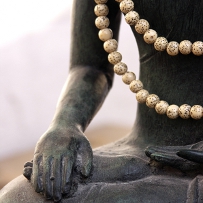|
|
|
|
|
 |

|

|

|
The greatest gift is the
gift of the teachings
|
|

|
| |
|
Dharma Talks
given at Spirit Rock Meditation Center
|
2025-09-17
Awakening from Ignorance: Going beyond the Main Habitual Constructions of Experience 2
63:38
|
|
Donald Rothberg
|
|
|
We begin with a review of how the Buddha saw "ignorance" of the basic nature of things (not so much of facts or information) as the basic problem of human life; we are as if asleep, caught in dream-like living, and need to "wake up." For the Buddha, we are especially ignorant about impermanence, dukkha (or reactivity--grabbing at the pleasant and pushing away the unpleasant or painful and believing that this is the way to happiness), the nature of the self, and nirvana or awakening.
We bring in a brief report of the experience of attending the previous week's EcoDharma retreat at Spirit Rock, emphasizing especially the pervasiveness of a sense of separation--from the earth, other living beings, and each other--and the connection of such sense of separation with our systemic problems. Indigenous teachers at the retreat particularly emphasized living without such separation.
The second part of the talk, we focus on the teaching of not-self (anatta), and ways of practicing that deepens our understanding of not-self, as well as how we hold this understanding of pervasive human ignorance with compassion and kindness, including in our responses to the manifestations of ignorance.
The talk is followed by discussion.
|
|
Spirit Rock Meditation Center
:
Monday and Wednesday Talks
|
|
|
2025-09-16
Obstacles on the Path: Sense Desire & Aversion (Retreat at Spirit Rock)
55:51
|
|
Gullu Singh
|
|
|
Talk Synopsis: Clearing the Poisons – Greed and Aversion
This talk explores how the Buddha’s teachings on dukkha and the three unwholesome roots—greed, aversion, and delusion—relate to the common mental obstacles that arise in meditation and daily life. Framed through the lens of the five hindrances, the talk looks closely at how these energies obscure attention and contribute to suffering.
The talk includes a practical discussion of temperament—how some of us tend more toward craving, others toward irritation or confusion—and how understanding these patterns can support clarity and compassion. Rather than trying to get rid of these states, the emphasis is on recognizing and relating to them with awareness, in line with the Buddha’s instruction to know dukkha and its causes.
Grounded in the Four Noble Truths, the talk points toward a path of practice that works with what's difficult—not as a problem to fix, but as a doorway to insight and freedom.
|
|
Spirit Rock Meditation Center
:
Clearing the Path: Opening the Heart and Mind
|
|
|
|
|
|
|
|
|